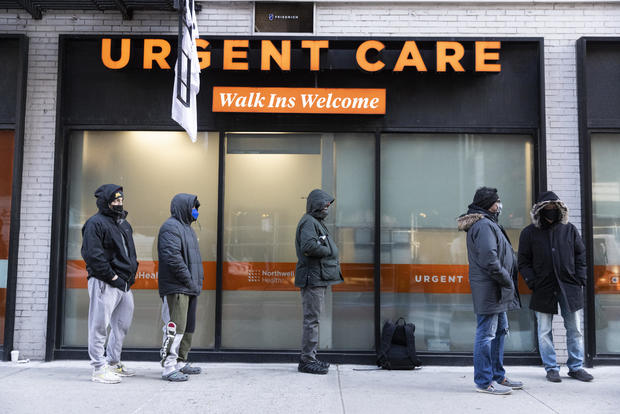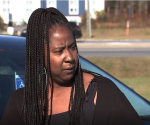COVID-19 testing wasn’t where it needed to be. Then Omicron hit.
[ad_1]
The U.S. was already struggling with limited supplies of rapid at-home tests and long turnaround times for lab-based tests in recent months, even though the number of COVID-19 infections remained relatively flat or was only slowly inching upward.
Now as the highly infectious Omicron variant spreads rapidly — and winter weather strikes, and families prepare to gather for the holiday season — manufacturers of over-the-counter test kits and labs that process more sensitive polymerase chain reaction, or PCR tests, cannot keep pace with demand. These days, the sight of long lines of pedestrians queued up along sidewalks or motorists sitting bumper to bumper in parking lots for hours means one thing: People are waiting for COVID-19 tests.
The Biden Administration acknowledged earlier this year that it needed to ramp up the nation’s testing efforts, and pledged to make tests cheaper and more widely available by investing $1 billion to expand the supply of at-home COVID-19 tests. But there are still not enough tests to go around as of mid-December. Just ask anyone who has tried to get their hands on an Abbot Labs or Quidel test kit — two popular varieties — in recent days and has struck out at multiple major pharmacies across New York City’s five boroughs and beyond.
“The Biden administration has done a lot to make testing more visible, stronger and more available; they shored up the supply chain and put in a lot of money to buy new tests. However, with Omicron it does not seem to be enough,” said Mara Aspinall, a testing expert and professor of biomedical diagnostics at Arizona State University. “The perfect storm is the Omicron variant, the holidays and the winter season with the flu coming as well.”
The surge in demand for nearly every variety of COVID-19 test, including lab-based tests, rapid antigen tests administered at the point of care, and at-home testing kits, comes as the Omicron variant again upends how we interact as a society. It has, in recent weeks, sent students and faculty home early from colleges and universities, forced the closure of dozens of restaurants in New York City and elsewhere, and has delayed major employers’ return to office dates — again.
“Sadly we have not mastered it”
The swelling number of positive tests in densely populated areas makes exposure to the virus likely, leading more individuals to seek tests as a precautionary measure to ensure they are healthy or, if they are infectious, not to expose others.
“We are definitely lagging in our capacity,” said Keri Althoff, a professor of epidemiology at Johns Hopkins Bloomberg School of Public Health. “Testing has been such a huge challenge since the very beginning of this epidemic and there have been times where it’s gotten better. Sadly, we have not mastered it and Omicron is a formidable challenger to our testing system — and it’s clear we are not keeping up.”
Angus Mordant/Bloomberg via Getty Images
In New York City, for example, the percentage of people who have tested positive reached nearly 8% for the week ending December 17— more than double the seven-day average from a week earlier, according to city data.
The city calculates the positive test rate based on diagnostic test results, including molecular-based PCR tests, and antigen tests. Individuals who use at-home rapid tests do not always report results, indicating that the positivity rate could in fact be even higher.
The rapidity with which the Omicron variant has spread has caught facilities off guard. In addition, the lab technicians who process test results are not immune to the virus either, leading to staffing shortages and delays in test-processing times.
“People working in these environments are testing positive for Omicron and that takes them out of those workplaces,” Althoff, added. “The spread happening in the community also impacts health care workers, and lab technicians work in communities — they are not somehow magically not susceptible to that community spread.”
Free at-home test kits and other bright spots
Of course, some progress has been made since October, when President Biden announced his administration would ramp up testing efforts, which still lag behind other countries, like the U.K., where at-home testing kits are free and widely available.
Baltimore, Maryland-based Althoff said she was recently contacted by her city’s department of health, which said it is now distributing free, at-home antigen test kits at the local public library.
“Of course that is a really critical piece of the testing puzzle because people can run that out of their homes without delay and make a decision to attend a holiday event based on those results,” she said.
The Centers for Disease Control and Prevention last week started distributing free at-home test kits at select airports across the nation. They include Chicago O’Hare International Airport, Dallas/Fort Worth International Airport, Miami International Airport and Minneapolis-Saint Paul International Airport, according to a CDC spokesperson. Test kits will soon also be available at airports in Detroit; Honolulu; Philadelphia and San Juan, Puerto Rico.
The pandemic has also spawned a veritable cottage industry in lab-based testing for COVID-19, with new labs and clinics seemingly popping up overnight to cope with new demand.
Clear19 Rapid Testing, founded in March 2020, before vaccines became available, uses a robotic lab for molecular-based testing that can process 90,000 specimens overnight, delivering test results to patients within 24 hours.
“We are continually expanding capacity and, anytime there is a surge, the lab can absorb the impact. That’s why we can guarantee overnight results,” said Sandy Walia, founder and director of Clear19.
Peter Foley, founder and CEO of Let’sGetChecked, an at-home test kit company that makes lab-based COVID-19 tests, acknowledged that “with Omicron we’ve found ourselves in a similar situation as to where we were last year.”
But Foley anticipated the Omicron-driven surge in demand, given the seasonality of the virus. “What’s important is that we are getting pattern recognition for when the peaks may occur, with almost two years of data under the belt,” he added.
Steven Crossley, head of operations and strategy at testing outfit Genetworx, which has administered nine million COVID-19 tests nationwide, said the company staffed up, in anticipation of a winter surge, and is still able to deliver PCR test results overnight.
“We invested heavily in infrastructure and people and processes early on in the pandemic to make sure testing times for patients never fell behind. Today we are still delivering results in less than 24 hours,” he said.
Genetworx is also currently hiring, holding a virtual hiring event for medical technicians and specimen processors in its Woodbridge, New Jersey, laboratory.
“We’re going to continue to do what we ned to do to make sure we stay within those turnaround times,” Crossley said.
Download our Free App
For Breaking News & Analysis Download the Free CBS News app
[ad_2]
Source link











